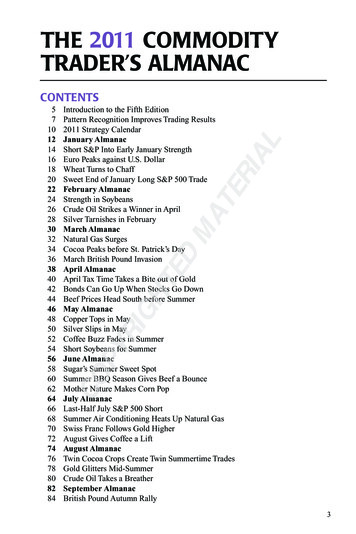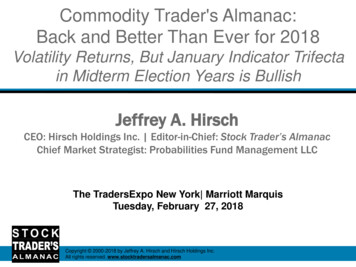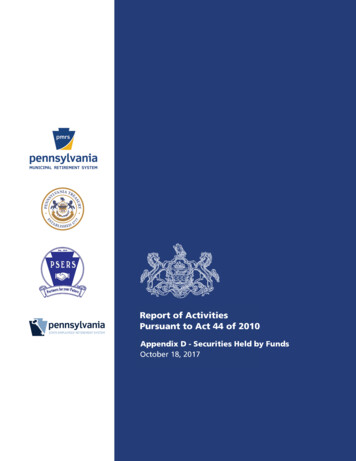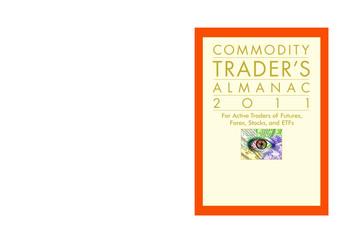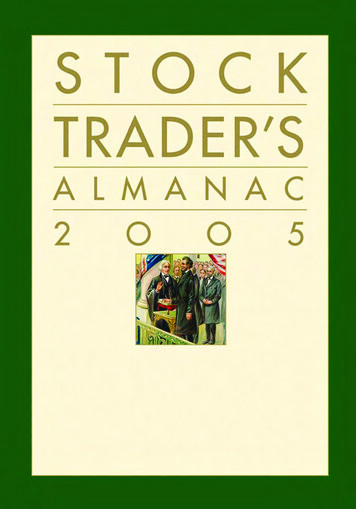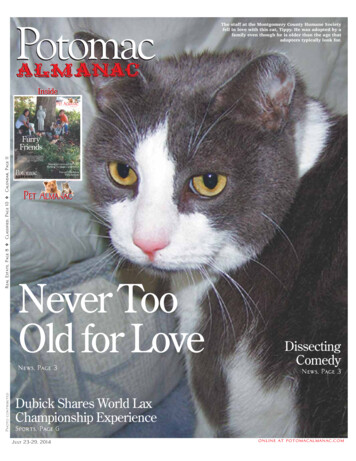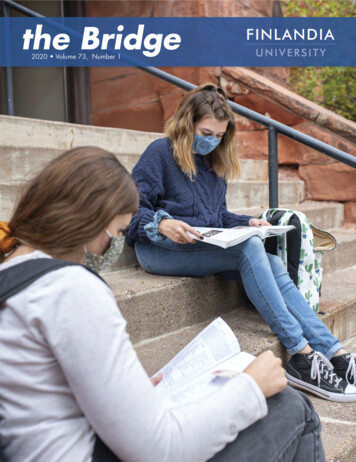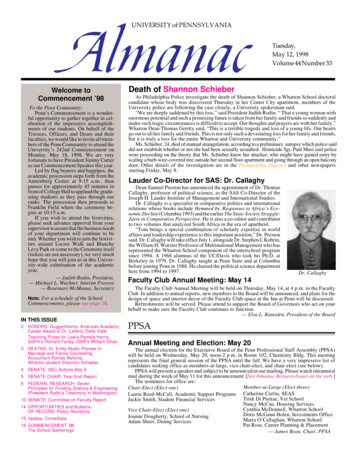
Transcription
UNIVERSITY of PENNSYLVANIATuesday,May 12, 1998Volume 44 Number 33Welcome toCommencement ’98To the Penn Community:Penn’s Commencement is a wonderful opportunity to gather together in celebration of the impressive accomplishments of our students. On behalf of theTrustees, Officers, and Deans and theirfaculties, we would like to invite all members of the Penn Community to attend theUniversity’s 242nd Commencement onMonday, May 18, 1998. We are veryfortunate to have President Jimmy Carteras our Commencement Speaker this year.Led by flag bearers and bagpipes, theacademic procession steps forth from theAnnenberg Center at 9:15 a.m., thenpauses for approximately 45 minutes infront of College Hall to applaud the graduating students as they pass through ourranks. The procession then proceeds toFranklin Field where the ceremony begins at 10:15 a.m.If you wish to attend the festivities,please seek advance approval from yoursupervisor to assure that the business needsof your department will continue to bemet. Whether you wish to join the festivities around Locust Walk and BlancheLevy Park or come to the Ceremony itself(tickets are not necessary), we very muchhope that you will join us in this University-wide culmination of the academicyear.— Judith Rodin, President,— Michael L. Wachter, Interim Provost— Rosemary McManus, SecretaryNote: For a schedule of the SchoolCommencements, please see page 16.IN THIS ISSUE2HONORS: Guggenheims, American Academy;Career Award to Dr. Lafferty-Della ValleTeaching Prizes for Law’s Pamela Harris,GSFA’s Richard Farley, SSW’s William Silver3DEATHS: Dr. Emily Mudd, Pioneer inMarriage and Family Counseling;Accountant Romeo Belonia;Wharton student Shannon Schieber4SENATE: SEC Actions May 65SENATE CHAIR: Year-End Report8FEDERAL RESEARCH: SevenPrinciples for Funding Science & Engineering(President Rodin’s Testimony in Washington)10 SENATE: Committee on Faculty Report14 OPPORTUNITIES and BulletinsOF RECORD: Policy Revisions15 Update, CrimeStats16 COMMENCEMENT ’98:The School GatheringsDeath of Shannon SchieberAs Philadelphia Police investigate the death of Shannon Schieber, a Wharton School doctoralcandidate whose body was discovered Thursday in her Center City apartment, members of theUniversity police are following the case closely, a University spokesman said.“We are deeply saddened by this loss,” said President Judith Rodin. “ That a young woman withenormous potential and such a promising future is taken from her family and friends so suddenly andunder such tragic circumstances is difficult to accept. Our thoughts and prayers are with her family.”Wharton Dean Thomas Gerrity said, “This is a terrible tragedy and loss of a young life. Our heartsgo out to all her family and friends. This is not only such a devastating loss for her family and friends,but it is truly a loss for the entire Wharton and University community.”Ms. Schieber, 24, died of manual strangulation, according to a preliminary autopsy which police saiddid not establish whether or not she had been sexually assaulted. Homicide Sgt. Paul Musi said policewere proceeding on the theory that Ms. Schieber knew her attacker, who might have gained entry byscaling a barb-wire-covered tree outside her second floor apartment and going through an open balconydoor. Other details of the investigation are in the Philadelphia Inquirer and other newspapersstarting Friday, May 8.Lauder Co-Director for SAS: Dr. CallaghyDean Samuel Preston has announced the appointment of Dr. ThomasCallaghy, professor of political science, as the SAS Co-Director of theJoseph H. Lauder Institute of Management and International Studies.Dr. Callaghy is a specialist in comparative politics and internationalrelations whose books include Hemmed In: Responses to Africa’s Economic Decline (Columbia 1993) and the earlier The State-Society Struggle:Zaire in Comparative Perspective. He is also a co-editor and contributorto two volumes that analyzed South Africa in the era of apartheid.“Tom brings a special combination of scholarly expertise in worldaffairs and leadership experience to this important position,” Dr. Prestonsaid. Dr. Callaghy will take office July 1, alongside Dr. Stephen J. Kobrin,the William H. Wurster Professor of Multinational Management who hasrepresented the Wharton School component of the interschool programsince 1994. A 1968 alumnus of the UC/Davis who took his Ph.D. atBerkeley in 1979, Dr. Callaghy taught at Penn State and at Columbiabefore joining Penn in 1988. He chaired the political science departmenthere from 1994 to 1997.Dr. CallaghyFaculty Club Annual Meeting: May 14The Faculty Club Annual Meeting will be held on Thursday, May 14, at 4 p.m. in the FacultyClub. In addition to annual reports, new members to the Board will be announced, and plans for thedesign of space and interior decor of the Faculty Club space at the Inn at Penn will be discussed.Refreshments will be served. Please attend to support the Board of Governors who act on yourbehalf to make sure the Faculty Club continues to function.— Elsa L. Ramsden, President of the BoardPPSAAnnual Meeting and Election: May 20The annual election for the Exectuive Board of the Penn Professional Staff Assembly (PPSA)will be held on Wednesday, May 20, noon-2 p.m. in Room 102, Chemistry Bldg. This meetingrepresents the final general session of the PPSA until the fall. We have a very impressive list ofcandidates seeking office as members-at-large, vice chair-elect, and chair-elect (see below).PPSA will present a speaker and subject to be announced in our mailing. Please watch intramuralmail during the week of May 11 for this announcement. [See Almanac Between Issues on the web.]The nominees for office are:Member-at-Large (Elect three)Chair-Elect (Elect one)Laurie Reed-McCall, Academic Support Programs Catherine Curtin, SEASTrish Di Pietrae, Vet SchoolJackie Smith, Student Financial ServicesNancy McCue, Housing ServicesCynthia McDonnell, Wharton SchoolVice Chair-Elect (Elect one)Doris McGann-Bolen, Investments OfficeJoanne Dougherty, School of NursingMaria O’Callaghan, Wharton SchoolAdam Sheer, Dining ServicesPat Rose, Career Planning & Placement— James Bean, Chair, PPSA
TEACHING AWARDSHONORSNursing School: Dr. Lafferty-Della ValleDr. Mary Ann Lafferty-Della Valle, adjunct associateprofessor, will receive a special award, the Career Awardfor Excellence in Science Teaching, for her “sustained andstellar contributions to the teaching mission of the Schoolof Nursing,” to be given at the School’s Commencementon Sunday, May 17. (See p. 16 for details of School events).Dr. Lafferty-Della Valle has served on theNursing Schoolfaculty since 1974, teaching introductory course material ingeneral and organic chemistry, biological chemistry, andmolecular genetics to undergraduate and graduate students.She is also Director of the Laboratory for Biological Researchin Nursing. She has provided substantial assistance with theresearch of doctoral and postdoctoral students, and to master’sstudents and undergraduate students interested in acquiring skillsin biochemical technology.Especially respected for herability to present technicallydifficult content with great clarity, incorporating research findings and new technology intoher lectures and labs, she hasalso been praised throughoutthe years for “her enthusiasmfor her students, her discipline,and the discipline of nursing.”Dr. Lafferty-Della ValleFive Guggenheim FellowsThe John Simon Guggenheim Memorial Foundationhas chosen 168 artists, scholars, and scientists from 3000applicants as Guggenheim Fellows for 1998. Five fromPenn’s faculty, and their areas of study are:Dr. Eugene W. Beier, professor of physics, NeutrinosEmitted by the Sun.Dr. Larry Gross, professor of communication, Lesbians, Gay Men, and the Media.Dr. Mauro F. Guillen, assistant professor of management, Business, Labor, and Globalization in Argentina,South Korea, and Spain.Dr. Lee Haring, adjunct professor of folklore/folklife,Ethnography of Interpretive Communities.Dr. Neil H. Shubin, associate professor of biology, TheOrigin of Evolutionary Novelty.Music Alumni: Two of the six composers namedGuggenheim Fellows took their Ph.D.s in compositionhere, notes Music’s chair James Primosch: Dr. DavidCrumb, now assistant professor at the University of Oregon, and Dr. Robert C. Maggio, associate professor atWest Chester University.American Academy of Arts and SciencesAmong the 147 scholars elected Fellows of the American Academy of Arts and Sciences this spring are Dr. FanChung, Class of 1965 Professor of Mathematics in SAS;Dr. William F. DeGrado, professor of biochemistry/biophysics in Medicine; and Dr. Linda Aiken, the TrusteeProfessor of Nursing and professor of sociology in SASwho is director of the Center for Health Services and PolicyResearch. In October, Wharton’s Dr. Elizabeth E. Bailey,Hower Professor of Public Policy and Management, wasalso elected.Correction: In the story on the Davies Award to ProfessorLani Guinier (Almanac April 28), where it is noted that shewill leave the University soon, Professor Guinier shouldnot have been called Harvard’s first woman law professor,but Harvard’s first black woman law professor. There havebeen several women law professors there; the first of themto hold a named chair was Penn Law’s former professorElizabeth Warren.—Ed.2Law School: Pamela HarrisThe winner of the Law School’s Harvey LevinAward for Excellence in Teaching is Pamela Harris,assistant professor of law, a recognized expert in lawand religion as well as in criminal procedure. “As ateacher, she has an outstanding ability to energizestudents,” said a nominator. “Her classes are alsoextremely well organized and rigorous. Although sheis only in her second year of teaching, she already hasan enthusiastic and devoted following among the student body. No professor in the law school has ever wonthe Levin award so early in her teaching career.”The Levin Award was established by the Philadelphia law firm of Schnader Harrison Segal & Lewis tobe awarded annually to a faculty member in recognition of teaching excellence. The recipient is selected bymajority vote of students earning the J.D. in the yearthe award is made.Pamela HarrisGSFA: Richard FarleyThe 1997-98 GSFA G. Holmes Perkins Awardwill be presented to Richard Farley, adjunct associate professor of architecture at the Graduate Schoolof Fine Arts since 1983. Both a registered architectand a professional engineer, Professor Farley received his M. Arch and his M. Engineering degreesfrom Penn, where he studied under the renownedLouis I. Kahn. Professor Farley teaches Structuresand its Role in Architecture as part of the GraduateSchool’s M. Arch program, where his students“celebrate his ability to make his often dauntingsubject matter engaging and interesting.”A principal at the Philadelphia architecture, engineering, and interior design firm Kling Lindquist,Inc., Professor Farley is director of projects for thefirm’s corporate and institutional projects. His workthere includes such well-known area buildings asCenter City’s award-winning Bell Atlantic Tower.He is presently leading such projects as the DowJones Headquarters in Princeton, NJ, the J.P. Morgan Campus in Christiana, Delaware, and SAPRichard FarleyAmerica’s Corporate Headquarters in NewtownSquare. He has also won research fellowships fromthe American Institute of Architects to improve the design of buildings in regardsto seismic and wind-related natural hazards.The G. Holmes Perkins Excellence in Teaching Award recognizes distinguished teaching and innovation in classroom, seminar, or studio. It is named forthe School’s 1951-1971 dean, who is credited with transforming the GSFA intoa modern, interdisciplinary institution committed to the design of the environmentand the urban agenda.School of Social Work: Dr. William SilverThe recipient of the 1998 Excellence in TeachingAward from the School of Social Work is Dr. WilliamSilver, a lecturer at the School of Social Work—teaching Practice and Family Intervention. He hastaught the family class for over 25 years, having beenpart of the family therapy “revolution” in the 70’s,under the guidance of Salvadore Minuchin, Jay Haleyand Carl Whitaker and the talents of the PhiladelphiaChild Guidance Clinic. He subsequently focused onteaching marriage as a senior supervisor at the (then)Marriage Council of Philadelphia for ten years. Afterearning a BA at Hunter College, CUNY, in 1966, hetook his MSW (in 1968) and DSW (in 1976) at Penn’sSchool of Social Work.His area of interest, indeed his life’s work has beenin deciphering what the “relationship” is—and how itfunctions in every level of interaction—individual,couple, family, organization, community. As a socialworker, he practices and teaches this knowledge as away to help people who are disempowered.William SilverALMANAC May 12, 1998
DEATHSDr. Emily Mudd, Pioneer in Marriage and Family CounselingDr. Emily Hartshorne Mudd, a pioneer infamily planning, women’s rights and the studyof human sexuality who was with the Universityin formal and volunteer roles for more than sixtyyears, died on May 1, in her home at Haverford,at the age of 99.Individually and with her husband, the Pennmicrobiologist Dr. Stuart Mudd, Dr. Emily Muddhad worked throughout her lifetime to breakdown barriers to the dissemination of birth control information, to incorporate into medicaleducation the concept of human sexuality as partof family health, and to counsel individual patients from perspectives that were years ahead oftheir time when their work began.Through her own writing and her collaborations with other giants in the field, includingboth Dr. Alfred Kinsey and Dr. William Masters, Dr. Mudd influenced generations of patients and practitioners during her distinguishedcareer.Born in Merion, on September 6, 1898, EmilyBorie Hartshorne began her baccalaureate workat Vassar College, where she helped form a unitof the women’s Land Army who took overfarming tasks to free men for military service inWorld War I. After contracting typhoid feverfrom drinking fetid water in the field she wasadvised to seek outdoor settings, and she took uplandscape architecture in Massachusetts, whereshe earned a degree at the Lowthorpe School inGroton. In Boston she met and married StuartMudd, who was then a fellow at Harvard Medical School—and instead of practicing landscapearchitecture she became his volunteer laboratory assistant for the next ten years, assisting himat Harvard, at the Rockefeller Institute in NewYork and at the Henry Phipps Institute of theUniversity of Pennsylvania.When the Mudds and several of their friendsestablished the Maternal Health Center in 1927,at a time when state law made even the dissemination of information on birth control a crime,Emily Mudd became assistant to the director.She was later to say that she could take the riskbecause she was expecting her second child atthe time, and an obscure law prohibited thejailing of pregnant women. Although the clinicMemorial Service: Steve MurrayFriends and colleagues are invited tothe campus memorial service for StevenMurray on Tuesday, May 12, 1998. It willbe held at 4 p.m. in the Grand Ballroom ofthe Penn Tower Hotel. A reception willfollow the memorial. All are welcome toattend and share memories of Steve.The family has requested that in lieuof flowers, contributions be made to:The Steven Murray Foundationc/o Michael G. Cullen, Esq.211 North Olive StreetMedia, PA 19063Correction: In the photo caption in lastweek’s obituary on Professor DorotheaJameson, a letter was inadvertently omitted from her first name. We regret theerror.—K.C.G.ALMANAC May 12, 1998was raided three weeks after it opened, therewere no arrests.In 1933, when the Mudds and other activistsset up the Marriage Council of Philadelphia(now the Penn Council for Relationships), thegroup asked Emily Mudd to direct it, noting thatshe could take her degree “on the job.” Sheenrolled in the School of Social Work for herM.S.W. in 1936, and then in sociology, whereshe took her Ph.D. in 1950. Later she was toreceived the honorary degree LL.D. in 1972.She was appointed assistant professor of family study in psychiatry at the School of Medicinein 1952, becoming the third woman on theSchool’s faculty; and she became the School’sfirst woman full professor in 1956.The co-author with Stuart Mudd of 15 scientific papers from the volunteer phase of hercareer, she was to publish another 106 of herown and 64 with other co-authors, writing extensively for professional journals to reach practitioners but also publishing in major nationalmagazines as a way of reaching families with theinformation gleaned from case histories andmajor longitudinal studies she undertook.She published five books: The Practice ofmarriage Counseling; Readings on Marriageand Family Relations; Man and Wife, ASourcebook of Family Attitudes, Sexual Behavior and Marriage Counseling; Marriage Counseling, A Casebook; and Success in Family Living. She also helped Alfred Kinsey edit the “second Kinsey Report” on Sexual Behavior in theHuman Female , and as consultant to the Masters& Johnson clinic in St. Louis she contributedthousands of case histories for their work.As a volunteer holding dozens of positions inlocal, state and national organizations—and suchinternational ones as membership in the RoyalSociety for the Promotion of Health—Dr. Muddexerted her influence on behalf of opennessabout birth control and sex education. What shedescribed as her most difficult assignment, however, was her service as co-chair in 1972 of thenGovernor Milton Shapp’s commission to reviewthe state’s abortion-control law—a commissionthat was to arrive at a split decision favoringchoice. On campus she was active in mentoringother women faculty and was president in 196263 of the Women’s Faculty Club (now Association of Women Faculty and Administrators).In 1967 she retired as director of the Marriage Council and became emeritus professor,but she continued to be active professionallyuntil well into her eighties, writing and counseling teens in Philadelphia.Among her many honors were the GimbelPhiladelphia Award, the Governor’s designation as a Distinguished Daughter of Pennsylvania, France’s Médaille d’Honeur, Societéd’Encouragement au Progrès, and the LucretiaMott Award of Women’s Way. An award fromthe American Civil Liberties Union, given in1989, was presented with the citation,Whereas Dr. Mudd has been a tireless advocate of women’s rights, reproductive freedom,and family values for more than sixty years,Whereas she has used the law as a light toilluminate the dark corners of our society,Now, therefore, we who have benefited fromher courage and been inspired by her integrity,do hereby confer upon her this Award with ourgratitude for her stalwart support in the strugglefor civil liberties.Widowed in 1975, Dr. Mudd married in 1981Frederick G. Gloeckner, who predeceased her.She is survived by two sons, John and S. Harvey;two daughters, Emily Mitchell and Margaret; 10grandchildren and eight great-grandchildren.Shannon Schieber, a Distinguished Wharton StudentShannon Schieber, a first-year Wharton doctoral candidate from Chevy Chase, MD, diedMay 7 at the age of 24.Ms Schieber earned high honors at DukeUniversity in Durham, NC, where she earned abachelor of science degree in three years, withtriple majors in math, philosophy and economics. Before coming to Wharton last fall with afull fellowship from the S.S. Huebner Foundation, she had worked for the financial advisoryservices arm of Coopers & Lybrand LLP in NewYork City for a year after her graduation fromDuke. Then, she went to work for Watson WyattWorldwide in Washington, DC, where she per-Romeo Belonia, AccountantAt presstime Almanac learned of thedeath of Romeo G. Belonia, an accountant in the Comptroller’s Office since1980 who has been responsible for HUP/CPUP accounts. An obituary is beingprepared with the help of his colleaguesfor the May 26 issue.formed asset/liability modeling and softwaredevelopment—in part following in her father’sfootsteps. Sylvester Schieber, a prominent economist, was chosen by the Clinton administraitonto a 13-member panel to help revamp SocialSecurity.Ms. Schieber’s research interests includedinternational social security programs, risk management strategies of American corporationsentering emerging markets, and securitizationof the insurance industry, according to the biographical sketch on the S.S. Huebner Foundation web site. Outside school she enjoyed travel,scuba diving, lacrosse, horseback riding, rockclimbing, opera, and cheering the Redskins.Neighbors in the quiet neighborhood alongthe 200 block of South 23rd Street described Ms.Schieber as “an attractive, friendly woman whosometimes greeted them from her balcony.” AWharton Journal article from November 17,1997, the “Wharton Ph.D. Experience” describedher as a lively and outgoing Ph.D. student.Her survivors include her parents and abrother. Funeral services are scheduled today inChevy Chase.3
Coverage to ComeSENATEFrom the Senate Of ficeCouncil: Summaries of the April 22discussion that followed the report of theAd Hoc Committee on Consultation, andof the presentations on vending given ina special meeting of that date, have beenfurther delayed because of space constraints.Vending Ordinance: The full text ofthe ordinance as passed by City Councilon April 23 has not yet been forwarded infinal form but upon release it is slated forposting to the websitewww.upenn.edu/foodplaza, along withupdated drawings and information onrelocations of vendors toward theordinance’s effective date of July 22,1998.—Ed.The following statement is published in accordance with the Senate Rules. Among otherpurposes, the publication of SEC actions is intended to stimulate discussion among theconstituencies and their representatives. Please communicate your comments to Senate ChairVivian Seltzer or Executive Assistant Carolyn Burdon, Box 12 College Hall/6303, 898-6943or burdon@pobox.upenn.edu.Actions Taken by the Senate Executive CommitteeWednesday, May 6, 19981. Welcome. The Chair welcomed current and incoming members of the Senate ExecutiveCommittee. Introductions were made.2. Report of the Past Chair on Academic Planning and Budget Committee and CapitalCouncil. Peter J. Kuriloff, 1997-98 Past Chair of the Faculty Senate, submitted his report in advancePennsylvania Muscle InstituteMini-Research GrantsStatement of PurposeMotility of cells, organelles, membranes and molecules underlies the behavior of living systems. The proteinseffecting this complex variety of motileevents in cells range from motor proteinslike kinesin, dynein and myosin, theirfilamentous partners, tubulin and actin,their regulatory and modulatory factors,controllers of spatial targeting within thecell, to mechanisms that coordinate motility with specific events such as mitosisand establishment of cell polarity. Toencourage Penn researchers to explorenovel approaches to studies of motility intheir fields of interest, the PennsylvaniaMuscle Institute (PMI) provides a MiniResearch Grant Program. The PMI willaward one year grants of seed funds up to 10,000 to successful proposals that explore novel aspects of skeletal, cardiacand smooth muscle, non-muscle cell motility, development, expression and assembly of contractile and motile organelles. Preference will be given to newinitiatives, new collaborations and juniorfaculty.The Application ProcessThe application consists of a threepage proposal, giving the background,objectives, experimental approach anddiscussion of expected results. In addition an abstract, budget (one page), briefcurriculum vitae including recent publications, current research support and listof other pending proposals should be submitted. Applications are due by July 1,1998. Successful applications will befunded as early as September 1, 1998, fora one year period. All applications involving human subjects, animals, andhazardous or radioactive materials mustreceive institutional approval prior tofunding.Please send the original and 4 copiesof the grant application to Dr. Yale E.Goldman, Director, Pennsylvania MuscleInstitute, D-700 Richards Building,School of Medicine, 19104-6083.due to his inability to attend the meeting. He also expressed his positive experiences as part of theSenate leadership.The Academic Planning and Budget Committee met twice since SEC’s last meeting. Theydiscussed the University’s budget and the capital budget. The capital budget has grown dramatically.School building projects are systematically and methodically tied to school fund raising. Long-termthinking about the annual budget cycle has positioned both schools and central administration tomanage growth and projected difficulties more effectively.Old Business3. Law School Proposal. A proposal from the Law School to establish the position of SeniorLecturer in the Law School was presented by Professor Robert Hornik, chair of the Committee onthe Faculty subcommittee on non-standing faculty. The committee determined that the position willhave no affect on the standing faculty in the Law School and recommended SEC approval. The Chairnoted that the Law School acted quickly on the Senate’s request for information set forth in a newlydeveloped protocol. SEC endorsed the proposal.4. Economic Status of the Faculty. Committee chair Professor Ed Boe presented a newrecommendation for possible inclusion in the committee’s annual report. Following extendeddiscussion SEC approved the proposal. The Senate Chair noted that the report will be published inthe May 26 Almanac or an early September Almanac, or both. She thanked Professor Boe for hisefforts on behalf of the faculty.5. Update on Consultation. The Chair reminded SEC that University Council had asked theSenate Executive Committee to codify the recommendations on consultation proposed by theUniversity Council Ad Hoc Committee on Consultation (Almanac April 14, 1998). SEC discussedmembership for a small committee to draft the codification. It is hoped that the committee will workover the Summer. SEC appointed members to the committee: Howard Lesnick (chair), DanielPerlmutter, Martin Pring, and Barbara Lowery (ex officio). SEC also authorized the committee toconsult with members of the Council Ad Hoc Committee on Consultation.6. College House Faculty Fellows. Concern was expressed over the use of “faculty” forindividuals who are not members of the faculty (Almanac May 5, 1998). A suggestion was made toreturn to the title “administrative fellow.” SEC instructed the Senate Chairs to raise the matter at theirnext meeting with the President and Interim Provost.7. Distributed Learning. The Chair drew attention to the Report of the Provost’s Committee onDistributed Learning (Almanac April 21, 1998). A SEC member inquired about the degree ofconsultation in creating the committee and whether it was a subcommittee of the Academic Planningand Budget Committee. It was noted that distance courses have been established in the WhartonSchool and the School of Nursing awards such a degree in Midwifery. In both schools they have beenapproved by the faculty through the normal course approval process. Concern was expressed aboutcontinued faculty oversight of all aspects of distributed learning. Another SEC member stated thatproposals in the committee report flow from each school to the Academic Planning and Budgetcommittee, which is not controlled by the faculty, and then go to the Trustees. Further, contracts ondistributed learning are monitored by the General Counsel and the Executive Vice President. A SECmember asked that faculty also consider the good things about distributed learning. It wasrecommended that the matter be taken up by a Faculty Senate committee.A motion was made that: “The Senate Executive Committee considers the policy on distributedlearning of serious academic concern, and formally requests that no other policy be approved untilthe Faculty Senate reviews it. Furthermore, SEC refers the matter to the Committee on Students andEducational Policy.” The motion was adopted.8. Chair’s Report. The Chair reminded SEC members that two years ago the Faculty Senate votedto abolish the annual meeting of the Faculty Senate and called for the Faculty Senate Chair to givean extended annual report to the faculty (see p. 5 of this issue). She presented a verbal summary ofthe report. She stated that it had been a pleasure to work with SEC members who provided insights,refinements and solid information to matters brought forward. In addition, working with suchcollaborative faculty, for which she expressed appreciation, the Senate committees had worked veryhard. Upon invitation, SEC members suggested items for consideration by Senate committees nextyear.(continued next page)4ALMANAC May 12, 1998
Outgoing Chair Vivian Seltzer thanked outgoing officers and Executive Assistant CarolynBurdon and turned the meeting over to incomingChair John Keene.New BusinessChair John Keene thanked outgoing PastChair Peter Kuriloff for the wonderful opportunity to work with him and for his enthusiasm,SENATEand he thanked outgoing Chair Vivian Seltzerfor her leadership and work to set the ship of theFaculty Senate on course. He also thanked Senate Committee chairs, outgoing Senate Secretary Jack Nagel, and Executive Assistant CarolynBurdon for the wonderful job they have done.The Chair stated that many issues for next yearconnect with shared governance and the role ofthe faculty in the University.9. Council Steering Committee. Nominations were made for the selection of four SenateExecutive Committee members to serve on the1998-99 University Council Steering Committee. SEC voted by paper ballot.10. June Meeting. SEC voted to cancel themeeting scheduled for June 3.From the ChairReport of the Chair to the Faculty SenateMay 6, 1998Until recently, annual meetings of the Faculty Senate were held inApril where the President and the Provo
earning a BA at Hunter College, CUNY, in 1966, he took his MSW (in 1968) and DSW (in 1976) at Penn's School of Social Work. His area of interest, indeed his life's work has been in deciphering what the "relationship" is—and how it functions in every level of interaction—individual, couple, family, organization, community. As a social
